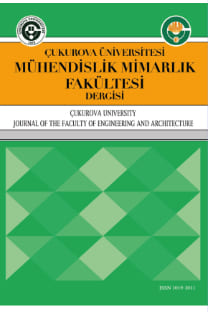Evrişimli Sinir Ağları için Maksimum Ortaklama Devre Tasarımları
Max-Pooling Circuit Designs for Convolutional Neural Networks
___
- 1. Goodfellow, I., Bengio, Y., Courville, A., 2016. Deep Learning. MIT Press.
- 2. Hamdan, M.K., Rover, D.T., 2017. VHDL Generator for a High Performance Convolutional Neural Network FPGA-based Accelerator. In 2017 International Conference on ReConFigurable Computing and FPGAs (ReConFig) 1-6. IEEE.
- 3. Dinelli, G., Meoni, G., Rapuano, E., Benelli, G., Fanucci, L., 2019. An FPGA-based Hardware Accelerator for CNNs Using Onchip Memories Only: Design and Benchmarking with Intel Movidius Neural Compute Stick. International Journal of Reconfigurable Computing. Hindawi.
- 4. Shawahna, A., Sait, S.M., El-Maleh, A., 2018. FPGA-based Accelerators of Deep Learning Networks for Learning and Classification: A Review, 7823-7859. IEEE Access.
- 5. Hwang, W.J., Jhang, Y.J., Tai, T.M., 2017. An Efficient FPGA-based Architecture for Convolutional Neural Networks. In 2017 40th International Conference on Telecommunications and Signal Processing (TSP), 582-588, IEEE.
- 6. Li, Y., Song, B., Kang, X., Du, X., Guizani, M. 2018. Vehicle-type Detection Based on Compressed Sensing and Deep Learning in Vehicular Networks. Sensors, 18(12), 4500.
- 7. Rajaraman, S., Candemir, S., Kim, I., Thoma, G., Antani, S., 2018. Visualization and Interpretation of Convolutional Neural Network Predictions in Detecting Pneumonia in Pediatric Chest Radiographs. Applied Sciences, 8(10), 1715.
- 8. Ren, S., He, K., Girshick, R., Sun, J., 2015. Faster r-cnn: Towards Real-time Object Detection with Region Proposal Networks. In Advances in Neural Information Processing Systems, 91-99.
- 9. Abdel-Hamid, O., Mohamed, A.R., Jiang, H., Penn, G., 2012. Applying Convolutional Neural Networks Concepts to Hybrid NNHMM Model for Speech Recognition. In 2012 IEEE International Conference on Acoustics, Speech and Signal Processing (ICASSP), 4277-4280, IEEE.
- 10. Qiao, S., Ma, J., 2018. FPGA Implementation of Face Recognition System Based on Convolution Neural Network. In 2018 Chinese Automation Congress (CAC), 2430-2434, IEEE.
- ISSN: 1019-1011
- Yayın Aralığı: Yılda 4 Sayı
- Başlangıç: 1986
- Yayıncı: ÇUKUROVA ÜNİVERSİTESİ MÜHENDİSLİK FAKÜLTESİ
Çaldıran Fayı’nın Çaldıran İlçesi Dolayında Paleosismolojik ve Neotektonik Özellikleri
Hakan GÜNEYLİ, Müjdat YAMAN, Vildan YILDIRIM
Hastanelerde Isıtma, Havalandırma ve İklimlendirme Uygulamalarının Enerji ve Ekserji Analizi
Kale Mawlood MINA, Hüsamettin BULUT
Paletli Bir Mobil Robotun Modellenmesi ve Bulanık Mantık ile Yörünge Kontrolü
The Effect of Design Phase Meetings on Change Orders in Building Construction Projects
Olcay GENÇ, Hilmi COŞKUN, Ercan ERDİŞ
Air Quality Assessment by Statistical Learning-Based Regularization
Openair® Plazma Sisteminin Polyester İçerikli Çözgülü Örme Kumaşlara Etkisinin İncelenmesi
SEZGİN Sabiha BOZOK, R. Tuğrul OĞULATA, Serin MEZARCIÖZ MAVRUZ
Ali Talip PINARBAŞI, Mustafa Kemal KÜLEKÇİ, Uğur EŞME, Cem BOĞA
